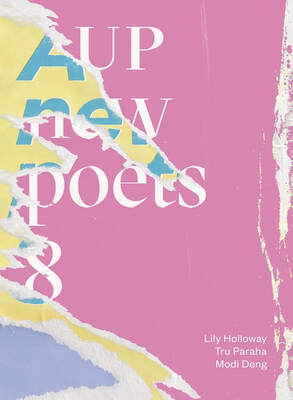
by Lily Holloway, Tru Paraha, Modi Deng.
Anna Jackson (Ed)
This is the latest compilation in a series, which provide a good foundation for Aotearoa New Zealand poets to – all going well – have their own collections published later.
From my experiencing this compilation, the only thing the three poets have in common is that all are young, articulate, and intelligent women, as witnessed in their toikupu here. Which, however, is divergent even in their individual pieces, as well as among the three poets. Holloway and Paraha in particular, can be classified as experimental poets in the way that much of the former and all the latter’s work is a faaaaaaaaaaaar cry from ‘traditional’ verse/stanza layout, while Deng also displays a measure of innovation with her prose poems and in tabulated work like lessons.
What I noticed about the ambience of Holloway’s mahi – titled a child in that alcove – is that there is a consistent mood of dark thoughts, depression, self-effacement, which is more manifest than latent. Take for example these lines from as the tide (p. 9), where ‘I’ has become ‘i’,
i look out to that expanse,
bare now to the beaks of grey herons,
which i realise is me
in this metaphor
Elsewhere, as her/their poems develop across the pages of the anthology towards found poetry and w i d e o p e n spaces, Holloway casts herself with lines such as,
The quietest panic attack happens when my heart is a small dog (from stocktaking during venlaxafine discontinuation p. 13)
And,
I am a dog so it doesn’t matter much (from Is any of this relevant? p. 17)
There is a consistent inner turmoil and torment here, as the poet eerily unravels herself in poems with revealing titles such as you are my night terror i hope i am yours (p. 12) and moirai (pp. 23-26).
Images return again (the title of a poem on page 11) here and there too, in a sort of Plathean frenzy, among them a Four Square carpark and supermarkets, as the poems as presented in this book deconstruct and yet reconstruct in a whole new way/Holloway.
In her introduction, editor, Anna Jackson writes about the work of Paraha, ‘These poems are not easily read for narrative or scene-setting and it would be possible to feel a little lost, as a reader’. Āe, tika tēnei kōrero. There are no titles. There are few if any verses. Words and letters throw themselves across and around a page, spill in a
s p r e a d e a g l e d manner in two interspersed tongues, te reo Māori rāua ko te reo Ingarihi.
Paraha is deliberate in this depiction of our cosmos. It is a massive never-ending, perhaps never-able-to-end and ongoing process, paradoxically full of lacunae. Her work is a set of paintings to be perceived and experienced on a screen, on a wall, as a video behind a melee of dancers. Paraha is sui generis, hers a whole new poetry planetarium. She is enmeshed in Te Kore, va, ki tua (beyond) as splayed over pages 49-51, in a complete dismantling of language, of the inherent straight-line concept(s) we generally associate with any given word. My pātai becomes, when watching this star trek, ‘where does the end begin?’ in my darkling universe, the artist cannot reply, as no one can. Rather, she flirts here and there with possible cogent universe ‘meaning’ as with the words made up from highlighted letters torrented down a page – ‘hone’ and ‘alistair’ – while having fun inhabiting te hinengaro me te tinana of a cannibal in wheniwasacannibal with compressed lines like,
iwaswaitedonhandandfootsotospeak. (p. 71).
This cosmic stuff does not/cannot suit a book. I look forward to witnessing Paraha at work/play across other media.
Modi Deng returns the reader (nearly) to planet earth with her structured verse, her less abrasive, comforting words – an wei. Witness this poem with the same title, here in its entirety,
When light pooled in,
the camber of your palm
and your quiet laugh dipped a reprieve, a catching net,
fullness to cheek hollow –
I couldn’t help it. Your candour was
embodied/your words fading/
our rhythm softly a morning moon. (p. 81).
In the 17 poems included here, Deng writes about (mis)communication with her mother, love affair(s). music, the UK, where she is a postgraduate student at the Royal Academy of Music. Hers is a gentler cadence, rather an innocence surrounding,
…my
soft (read weak) heart (from lightning courses (p. 92).
The standout piece for me is Euston Road, where the poet systematically relates her medical event, and the aftermath,
leaving behind the paranoid clinical
attendants, all the pear-nurses and
the requisite burnt soya coffee (p. 95).
Three poets, three distinctive voices sampling on a wide – perhaps endless - continuum of topoi and technique. After all, ‘There is no end to possible meanings’ (from Holloway’s Is any of this relevant? pp. 17-19).
Tēnā koe mō tēnei raupapatanga.
Author: Lily Holloway, Tru Paraha, Modi Deng. Anna Jackson (Ed)
Publisher: Auckland University Press
ISBN: 9781869409456
RRP: $29.99
Available: bookshops

 RSS Feed
RSS Feed
